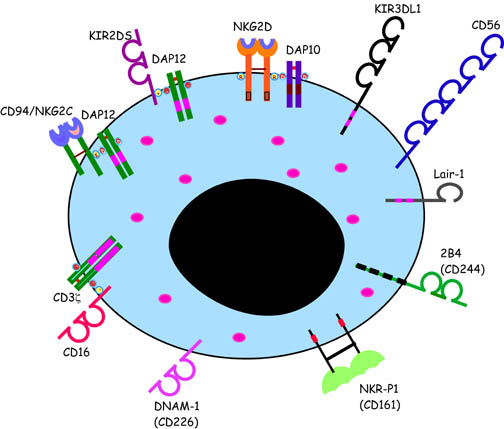Natural killer (NK) cells are a type of white blood cell that provides protection against microbial pathogens and tumors. Since the early 1980’s, our lab has investigated how NK cells distinguish between normal healthy cells and cells that are transformed or infected with viruses. NK cells express a diverse array of inhibitory and activating receptors on their cells surface that bind to ligands expressed on the cell surface of potential target cells. When encountering healthy cells, signals transmitted by inhibitory NK receptors dominate and prevent autoimmunity, whereas the loss of ligands for the inhibitory receptors or the upregulation of ligands for the activating NK receptors on infected or transformed cells allows NK cells to kill these abnormal cells and secrete cytokine that influence the subsequent response by T cells and B cells. We have developed mouse models systems in which key signaling molecules such as DAP10 and DAP12 have been ablated to explore the physiological role of these NK receptors in resistance to viral infections (cytomegalovirus, poxviruses, and influenza) and primary tumorigenesis.

Watch the podcast of "License to Kill" - the 2011 Faculty Research Lecture in Basic Science
http://senate.ucsf.edu/2010-2011/frl-basicscience-2010-11.html
See American Association of Immunologists Oral History Project Interviews of Past Presidents
http://www.aai.org/About/History/Notable_Members/Presidents/Lanier_Lewis.html